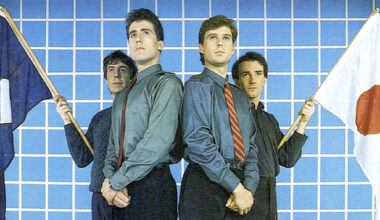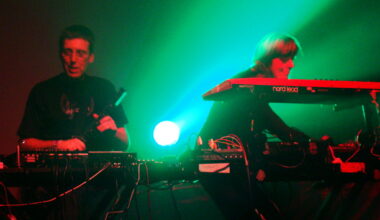Sheffield’s 65daysofstatic have rejected their old ways of working, and yet new album, ‘replicr, 2019’, is totally informed by their past. Any questions? Oh yes…
“When we started out, we thought we could invent a new kind of pop music – something that had never been made before,” laughs 65daysofstatic’s Paul Wolinski, drily.
Wolinski is one of the founding members of the Sheffield quartet, a band that’s antagonised music’s status quo since they formed in 2001. He’s the first to admit, however, that it was more than a little naive to think that crashing together punk rock and glitchy electronica on their ominously-titled fully instrumental 2004 debut album, ‘The Fall Of Math’, would herald the start of a chain reaction of seismic changes. Pop music today is barely any different compared to when ‘The Fall Of Math’ dropped, if anything it’s become safer, more sanitised, more predictable.
But hey, you can’t blame a band for trying. Wolinski quotes Karl Marx’s suggestion that it’s futile to conceive of improving something – society in Marx’s case – without a bit of utopian thinking. And the fact that pop music wasn’t subverted by 65daysofstatic’s arrival hasn’t stopped them from continually evolving, from early guitar-led post-rock gestures, through algorithmically-developed pieces and finally to their new album, ‘replicr, 2019’. It’s a record executed through rejecting how they’d worked together before, but which couldn’t have existed without their history; a record that wryly comments on capitalism without using any words at all; a record that uses the convention of the album to cynically challenge the form from within.
65daysofstatic – named after a semi-mythical John Carpenter film or maybe nothing in particular – were formed by Wolinski and Joe Shrewsbury the best part of 20 years ago, initially as a vehicle for the then-voguish tactic of making underground copyright-baiting bootleg remixes of overground pop artists.
The early 2000s were strange and unpleasant times: the world hadn’t ended with the Millennium bug, but by the end of 2001 the it had lurched in an unprecedentedly bleak direction. Computer meltdowns causing societal chaos had been replaced by advanced terrorist tactics as the foundation of our neuroses. Against that backdrop, 65daysofstatic’s ‘The Fall Of Math’ was a truly unsettling listen.
Having become a four piece with the addition Rob Jones and Simon Wright, the album was a beautifully messy concatenation of Tortoise’s spiky, angular guitars with the palette of glitchy, unpredictable beats that dominate Autechre’s singular take on electronica. It was easy to see why the band thought they were inventing something that simply couldn’t have existed before. By the time of 2013’s ‘Wild Light’, 65days decided to reflect on whether their efforts to do something completely new had actually paid off.
“With that album we dared to accept that there really was no new music to be found,” says Wolinski. “It wasn’t like giving up exactly, but it was basically encouraging ourselves to trust that this art form actually doesn’t need our efforts to poke it forward. I definitely think we needed to make that record in order to get to where we are now.”
Before we get to ‘replicr, 2019’, there’s what Wolinski describes as the “computer game detour”, the soundtrack they produced for the expansive galaxy-exploring 2016 video game ‘No Man’s Sky’. Realised over a three-year period, to call what they created a soundtrack at all smacks of trying to attach some sort of comfortable nomenclature to a rather complex and completely modern development.
“We went to the first proper meeting with the game designers thinking we were going to get a specific soundtrack brief,” says Wolinski, “and they said, ‘We want you to write a 65daysofstatic album, and that will become the soundtrack’. It was quite an open, vague thing.
“And then they said, ‘Oh, by the way, we’re going to need all of the stems at the end because we want to make it into this generative, infinitely-long piece – but you don’t have to worry about that’. And we were like, ‘No, hang on a minute – that sounds really interesting!’. What we ended up recording for them wasn’t actually what they wanted, originally.”
What they’d wanted was the more melodic side of 65daysofstatic that had been documented on ‘Wild Light’, with epic, big chord progressions and prominent synths.
“That was an interesting challenge for the band, because we really don’t like to repeat ourselves – it meant we had to find a way of doing it without feeling like we were cheating,” says Wolinski.
What the developers got was a band who wanted to get properly stuck into the process of adding sounds to the game during its lengthy development phase. They set about recording the tracks that can be heard on the ‘No Man’s Sky’ album, but then, essentially, took them apart again.
“We built these vast libraries of loops, sound palettes, melodies and multiple variations of themes – we took bits from the songs, but also added loads of extras at a greater granularity than just a few stems, like individual guitar notes.”
Bringing those elements back together into something coherent was an abstract process for the band.
“We couldn’t write anything to match scripted events, because nothing was ever going to be the same for each player,” he explains. “What we received instead was a description of a specific environment and then an interest level, and we were asked to compose to that. We used a software system that we’d built so that if a player was in space, for example, when the interest level was low, the engine would pick from a pool of six or seven stems that were grouped together by some shared logic.”

The stems selected would then evolve through controlled randomisation if the parameters – namely the environment and the prevailing interest level – were altered. The process of learning how to write using algorithms left a major impression on 65daysofstatic.
“It was so new, and so exciting, and we wanted to do more of it,” admits Wolinski, albeit with some hesitation. “The thing about ‘No Man’s Sky’ though was that we weren’t working to our own schedule, and that was quite new for us. Immediately after we’d finished, we decided to explore how that algorithmic stuff could be applied to being a band. We also wanted to reclaim our own trajectory and make sure we didn’t forever become the ‘No Man’s Sky’ band.”
The band called their new approach Decomposition Theory. It found them bringing the algorithmic approach into the way they composed at the outset rather than using it to create generative versions of pre-existing material. They also decided to perform live using the technique. Wolinski admits that its unpredictability on stage was stressful.
“The early shows were very unnerving,” he says with a laugh. “We were completely out of our comfort zone. Being on stage and not knowing exactly what was going to come out of the computers was a very uncomfortable feeling. The last thing we wanted to do was become self-indulgent, or present a show that just happened to not be very good for an audience, just because that’s the way the algorithms happened to run that night.”
To counter that, the group began slowly fixing elements of songs in place as the tour progressed, effectively taking the raft of material that was created out of the algorithms, but using those building blocks to form the basis for new songs.
“We just found ourselves naturally tightening up the edges and locking things down. I suppose we were composing as we went, through iteration, and finding out when to let songs generate themselves and when to lock them down again.”
‘replicr, 2019’ was crafted out of the wreckage of the Decomposition Theory experiment. It was almost as if the project had liberated the band to the point where they could see how all of the new techniques they’d learned could be applied to writing a new album.
“An album is a concrete thing, lasting a finite amount of time, and it needs to be a focussed, intentional object,” says Wolinski. “We realised algorithms are not best suited to that, at least not in the way we’d used them. Everything on the album started out with an algorithmic input in terms of the initial sounds or a basic arrangement, but we went through everything and we didn’t just let it be what it was. We were carving things out, and sculpting things, almost like reduction.”
The album is immediately recognisable as a 65daysofstatic record, despite sounding completely unique in their back catalogue. Guitars are virtually unidentifiable after being processed into textures and drones, and the whole affair carries a heavy, noxious ambience.
Dense, elliptical tracks like ‘Five Waves’ and the thudding robotic paranoia of ‘Stillstellung’ are bookended by shorter interludes, each labelled with titles that look like William S Burroughs cutting up sections of programming code.
If it feels edgy and likely to induce panic, that would be because of the political viewpoint that surrounds its creation.
“It’s trying to turn the dread that everyone is feeling in the world at the moment into some noise,” says Wolinski. “I find it very hard to not think that the world is a mess and that it’s just getting worse.”
A major inspiration for the tone of the record came from a copy of Walter Benjamin’s unfinished ‘The Arcades Project’ that they’d brought into the studio for the sessions. Benjamin’s treatise on the Parisian shopping arcades of the 19th century was an early sociological observation on the exponential growth of consumerism; the beautifully-constructed palaces of retail commerce that acted as his muse were the precursors of the shopping mall and elegant initiators of a consumer-driven fetishisation of luxury goods.
“Benjamin wrote about historical materialism with a metaphor about the ‘angel of history’ being blown into the future, but facing the past,” says Wolinski. “All it can see is the wreckage of history piling up behind us. What he was trying to say was that our view of history is effectively constructed in the present, but that it’s not like there’s no alternative. There absolutely has to be an alternative to this society we’ve built for ourselves – there has to be because it’s collapsing around us right now.
“But where are those new visions of the future? We don’t have the vocabulary as a society to envision our own futures and so we still rely on movies like ‘Blade Runner’ to tell us what it will be like. Putting 2019 in the title of the album and deliberately dating our record was like sticking a flag in time to say that this is already old. The future’s basically disappeared: 2019 is just another bad replica of every other year – and that copy is getting more and more corrupted over time.”
In spite of the album’s brooding insistence about the state of the world, Wolinski stresses that it isn’t a nihilistic offering. Instead he refers to it as being an “acceptance of the trap of the album”, a vestigial art form that can be seen as just another materialistic item in a capitalist society obsessed with commodities.
“The idea of making an album is entirely shaped through it being a commodity,” he asserts.
“Even a band is a commodity – it goes on tour, it
sells T-shirts. This sort of thinking is so deeply ingrained into what music is, into what the pop song is, that it’s very hard to think outside of that.
The algorithmic stuff was our attempt at separating ourselves from it, but then when it came to making this record we realised that utopian thinking isn’t really our forte. So making this record has made us look head on into the deathly concept that is the album and this world of modern pop culture: bands make records because that’s what bands are supposed to do. It’s just this totally unthinking process of how music should be consumed and how it should sound.”
He pauses, reflecting for a moment before concluding.
“That doesn’t make music redundant, because it’s not – it still has a very, very powerful voice.”
‘replicr, 2019’ is released by Superball Music






